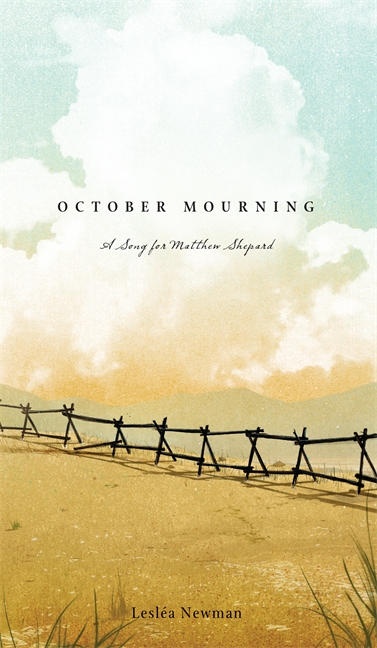Memory and Teshuva: A Review of October Mourning
 Leviticus 18, which deems men lying with men an abomination, has traditionally been part of the Yom Kippur service. Many congregations today opt for a substitute for this oft-quoted but underhistoricized text that has contributed to diverse forms of religious and secular homophobia. Whether we reject, historicize, or transform the meaning of these words that have hurt, we should relish opportunities to communally atone for complicity with traditional and contemporary forms of hate. Lesléa Newman’s October Mourning: A Song for Matthew Shepard, scheduled to be released on Erev Yom Yippur, is a “historical novel in verse” that inspires cultural memory and teshuva.
Leviticus 18, which deems men lying with men an abomination, has traditionally been part of the Yom Kippur service. Many congregations today opt for a substitute for this oft-quoted but underhistoricized text that has contributed to diverse forms of religious and secular homophobia. Whether we reject, historicize, or transform the meaning of these words that have hurt, we should relish opportunities to communally atone for complicity with traditional and contemporary forms of hate. Lesléa Newman’s October Mourning: A Song for Matthew Shepard, scheduled to be released on Erev Yom Yippur, is a “historical novel in verse” that inspires cultural memory and teshuva.
This slim but powerful volume of poems is divided into four parts. The prologue, a single poem titled “The Fence,” gives voice and perspective to an inanimate object, an innovative feature of this collection reminiscent of the talking bus and washing machine in Tony Kushner’s Caroline, or Change. After Matthew Shepard’s persecutors beat him, they tied him to a fence and left him for dead. This poem personifies the fence, clearly identified with the victim, before it became part of a hate crime: “will I always be out here/exposed and alone?”
One comment on “Memory and Teshuva: A Review of October Mourning”
Comments are closed.




Meyers’ poignant review of “October Mourning”evokes the message of sorrow, sadness and horror of our generation’s still existing homophobia of Leslea Newman’s poems. I will definitely buy this book as well as “A Letter to Harvey Milk.” As the mother of a gay son, I hope Newman’s book reaches a wider audience than the the families of gay sons and daughters. Everyone–homosexuals, heterosexuals, bisexuals and other discriminated minorities– still suffers from the atrocious behaviors of Americans and every American should shudder with the knowledge that we exist in such a hate-filled society. Newman and Meyers get the message across.